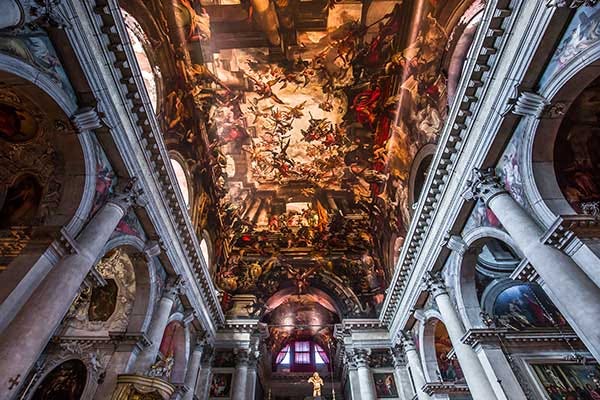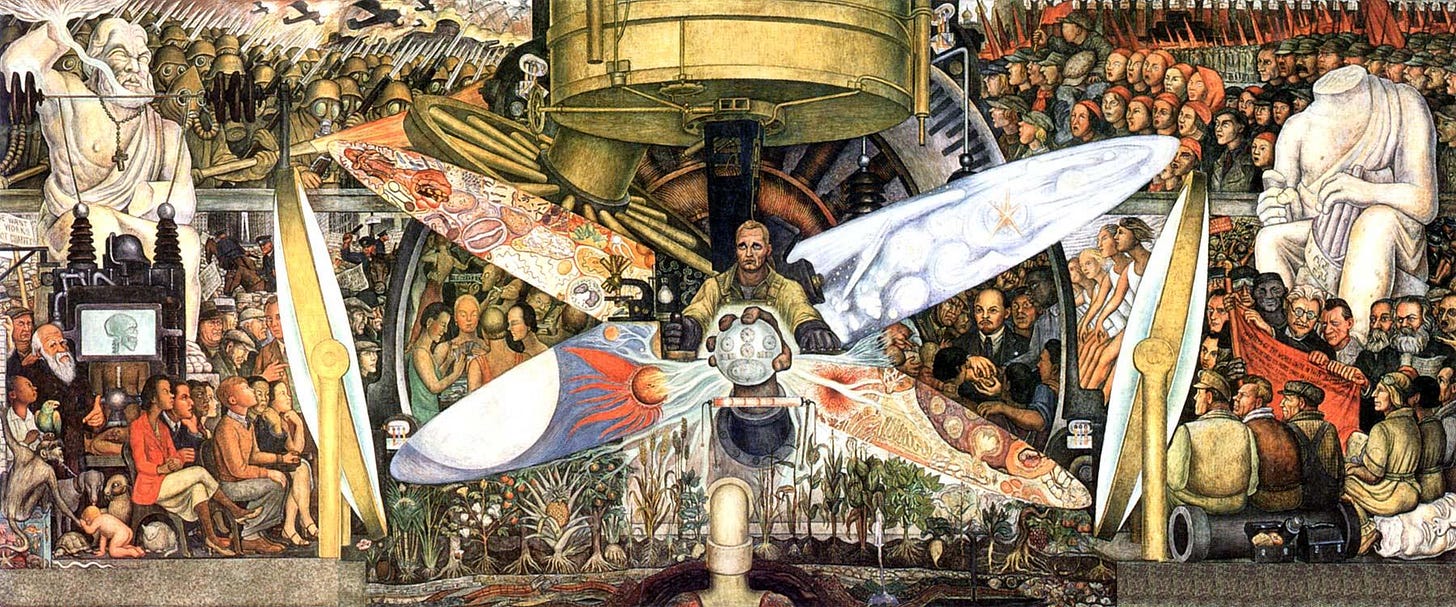The Questions we Must Answer
Reflections on neo-reactionary & 'RETVRN' strains in modern discourse
I want to talk about religion & modernity. There’s a movement in religious & political circles that claims to want to go back to pre-modern times, the so-called 'RETVRN traditionalists' or neo-reactionary movement.
The impulse here is respectable because to put it bluntly: we have lost much in modernity. Just looking at the interior of a church from medieval times, it’s obvious that we’ve lost something great and beautiful.
A friend,
, makes a great point with regard to religious folks trying to turn back the clock, so to speak:The traditionalist response (reaction, more properly) is simply to deny that modernity ever happened, to summon us back to a world where we believe “what the church teaches” (whatever church the given traditionalist may have decided to adhere to), where we simply accept late ancient (or medieval) metaphysics and morals and social structures, where we simply pretend that we can exist as a beseiged outpost of this kind of religious revanchism, a faithful remnant, and make a little world for ourselves.
Unfortunately, this true and faithful remnant of the Christian Kingdom simply… doesn’t exist. Perhaps in the monasteries of Mount Athos, or in small pockets of tiny rural villages where Christianity has settled in undisturbed for centuries. But these areas are rare, and the people writing about returning to tradition online are, I would suspect, almost never actually living in one of these little pockets.
After all, if they were, they wouldn’t have the time or the inclination to write so much online!
Loup continues:
It’s a lie. We don’t believe it. I certainly don’t, and I don’t think anyone else really does either. We are all still moderns. Our instincts are modern. Our instincts are, by any reasonable description, liberal. The effort to force ourselves into the thoroughly pre-modern mindset is just like my hopeless attempt to inwardly resuscitate a Ptolemaic cosmology. It can’t finally work. We are who we are, in the context we are, and very fundamental elements of our understanding of and feeling of the world are inescapably at odds with the past we say we want to reanimate and reinhabit.
I am sorry to be the bearer of these bad tidings to the young people coming in droves into the traditional churches, desperately seeking some kind of firm foundation that’s been stolen from them. They feel cheated and abused, because they have been.
I strongly agree that we live in a liberal time, and have deeply liberal instincts. We can't just pretend that we don't live our lives in a liberal way, and I suspect most people talking about a return to traditionalism are simply LARPers, as many non-traditionalists have, perhaps uncharitably, opined on at length elsewhere.
In other words, I suspect most conservatives that ostensibly want to tear down the liberal, modern culture we live in actually don't want to give up their liberal freedom and personal autonomy. It's all well and good to make arguments about tradition and the importance of paternal authority in the abstract, but personally submitting yourself to someone else's rule (in a very direct way, I understand that we are ruled indirectly now anyway) would likely be a bridge too far.
In addition though, I’ll admit that I simply think modern liberty is good. I'm a sort of reluctant conservative, but even in the traditional conservative picture of the world, personal freedoms from the state and even to a certain extent within traditional communities can fit well. To me, the project of the conservative in the modern world is not to sort of force us via governmental apparatus back into some halycon pre-modernity days; instead, the conservative impulse should be focused towards explaining and convincing people in a deep and genuine way that living in a more traditional way is better for society, and better for people in particular.
Going off that last bit - once you get some years under your belt, it becomes clear from a personal standpoint that a more disciplined lifestyle is just better. The saying that you have no heart if you aren’t a liberal in your 20s, and no head if you aren't a conservative in your 30s, rings true in large part because of this personal understanding. If you drink all the time, eat unhealthy food, smoke constantly, etc, you will very quickly find that your 'personal freedom' isn't worth much when you always feel terrible.
While convincing people may be much harder, I am convinced (heh) that it's the best way forward. As someone who changed my mind on the more traditional lifestyle through a mix of rational debate and personal experience, I am living proof that changing hearts and minds is possible on this front. Ultimately if we conservatives try to force a return to pre-modern times, not only may we lose technological advances, we risk losing all of the good things modernity has brought with regards to personal freedoms.
Where to Go From Here?
All this being said, I won't deny that modern liberalism has a lot of flaws, especially when it comes to the religious context. However, as I've argued, going back seems foolish and not that desirable even if we could.
Loup, in his article I cited earlier, asks: where is The Anchor? What can we cleave to in the confusing sea of modernity?
Indeed — what canst thou say? This is what I want to hear, what I want to discover, both in freedom, and in the deepest love and gratitude for our forebears in the faith. Because above all, I want to do this for the sake of cleaving to Jesus. What is the anchor, what is the center, when criticism turns everything upside down, when a mere formal, outward return to ancient faith is impossible, and where inwardly and existentially conforming myself to that ancient faith is also impossible? Where a thoroughgoing modernity, on the other hand, leaves us lost in a land barren and untrodden and unwatered?
It’s a wonderful question, and I think the religious question is being answered today by good faith Christians grappling with these questions. On a more practical and political level though, I have to admit the old Enlightenment appeal to rational self-interest still has a lot of appeal.
If we appeal to people’s own want and need for a fulfilling, enjoyable, and generally Good lifestyle, we can make an extremely strong argument for the traditional life. Yes we wont convince everyone, and perhaps some people would still choose to mire their lives in sin in the face of perfect information on this front, but that was always the case. Even if the imagined golden days of Christendom in the past, sin was rampant throughout society. We will always have sin as long as we live in the world, and it’s something we must accept.
Either way, the blind return to tradition as a religious and political project is deeply flawed. My dream is to turn the religious and conservative impulse of those who find fault in liberal modernity forward. I want to inspire this generation to ask questions such as:
What would a society that adhered to traditional norms but still allowed personal autonomy and freedoms look like?
How can we merge modern technology with a deeply religious worldview? How can we baptize our newfound power over Nature?
When should our relationship with Christ and the divine more broadly inform our worldly society? What would it look like to bring the Christian spirit to social reform, while avoiding the pitfalls of recent liberal Christian failures?
Unfortunately it seems few serious and compelling answers to these questions have yet been put forward, but if you disagree with modern liberal culture, these questions must be answered in order to move forward in a productive way.
How can we find a synthesis between modernity and the pre-modern, to create something more beautiful than either society on their own? This question lies at the core of our current societal upheaval, and the fate of our collective soul rests on how we answer it.





Great piece!
There's a quote I really like by Charles Peguy: “Everything begins in mysticism and ends in politics.” When religion is thought of as a tool to "fix" society, it's already been turned into a form of politics. But the initial appeal of the faith is its ability to influence people's inner lives, so politics is just running on the residual steam of the mysticism.
Maybe this is all just a cycle of piety and laxity. There's always been waxing and waning of faith in Christian history, and groups have always tried to revitalize the faith during periods of laxity. Take the Franciscans, the Jesuits, the American Great Awakenings. Maybe this is just how it works? Without a regular revitalization of a tradition to adapt it to present conditions, religions start to feel like "going through the motions" and the purpose gets obfuscated. Laxity in faith is even seen in the earliest Christians with disciples sleeping in the garden the night before the crucifixion!
Mysticism should definitely interface with the problems of the time and learn from the past (e.g. Franciscans/Dominicans reacting against the Catharist ideas of time). Modern technology and liberalism seem like pretty ambitious concepts to understand through mysticism, but ultimately very important!